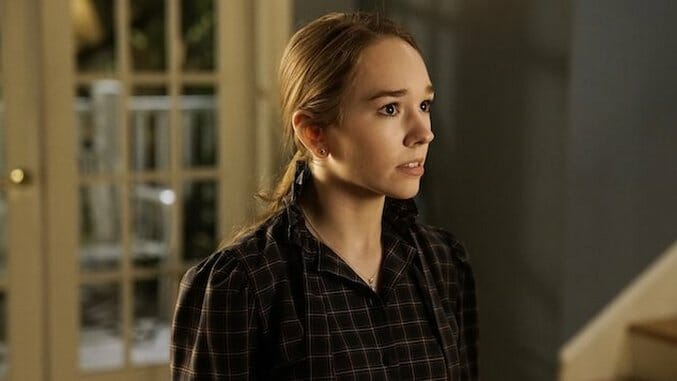The Americans: What’s in a Name?
(Episode 5.12)
Patrick Harbron/FX
Philip and Elizabeth Jennings are names on tombstones in an American cemetery, aliases adopted by Mikhail (Matthew Rhys) and Nadezhda (Keri Russell) upon reaching the United States, but they are also, as the pair admits to Paige (Holly Taylor) in “The World Council of Churches,” their “real names” now—disguises worn so long they’ve supplanted the people underneath. The implications of Shakespeare’s oft-quoted question, and the fact that we are more complex organisms than the rose that remains a rose, so thoroughly permeate the season’s penultimate episode that it begins to seem an obsession. As The Americans nears the end of its most ambitious arc, a painstaking, jet-black portrait of the families we make and break over the course of life’s long passage, “The World Council of Churches” considers the relationship between what we call ourselves and who we are: What, after all, is in a name?
“I miss my old name, too,” Philip adds, when Paige asks after the origins of “Jennings.” Mikhail, or Mischa: The name by which he’s known to his brother, sister-in-law and nephew in Russia; the name of his estranged son (Alex Ozerov), whiling away his days in a mirthless Soviet factory when his uncle invites him to dinner. (“He lives abroad. He’s some kind of hero,” Mischa says of Philip, rueful. “I’m not supposed to ask about him, either.”) In the context of the season’s raft of flashbacks to Philip’s childhood, not to mention his and Elizabeth’s renewed interest in going “home,” the fact that Philip misses his old name—even as he accepts Philip as his “real” one—is telling. The central slippage of espionage, the one that brings the Jennings low after the gruesome climax of “Dyatkovo,” is that among the agents’ multiple selves, and much of Philip’s upset this season stems from the fact that self and name no longer match. Is he the suburban father concerned that Stan (Noah Emmerich) might end up like Martha, and does this mean he’s also still Clark? Is he the Mischa he remembers, the Mischa that married Nadezhda in “Darkroom,” or is he neither, or both?
The Americans offers no clear answers to these questions, because, of course, there are none: It is not only spies that wear disguises, assuming and discarding identities as circumstances change. Paige removes the cross around her neck in the opening sequence, so far from the eager communicant of “Born Again” she might be a different person; Henry (Keidrich Sellati), emboldened by his success at school and his relationship with Chris, prepares a dinner for his parents that’s so surprising they’re left more or less speechless, as if the immature boy of seasons past had been replaced with someone else. That moment in which Elizabeth retrieves the pendant from the trash and places it in Paige’s hand, like the one in which the elder Jennings pretend all’s well with Henry’s plans for prep school, draws the poignant point that dissembling is not as difficult as we prefer to believe. I, too, have worn more disguises than I can count, trained only by the notion that my name—which means “gift of God”—doesn’t quite match my self, either.
-

-

-

-

-

-

-

-

-

-

-

-

-

-

-

-

-

-

-

-

-

-

-

-

-

-

-

-

-

-

-

-

-

-

-

-

-

-

-

-








































